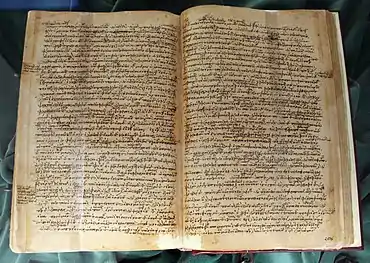Sense and Sensibilia (Aristotle)
Sense and Sensibilia (or On Sense and the Sensible, On Sense and What is Sensed, On Sense Perception; Greek: Περὶ αἰσθήσεως καὶ αἰσθητῶν; Latin: De sensu et sensibilibus, De sensu et sensili, De sensu et sensato) is one of the short treatises by Aristotle that make up the Parva Naturalia.
 |
| Part of a series on the |
| Corpus Aristotelicum |
|---|
| Logic (Organon) |
| Natural philosophy (physics) |
|
| Metaphysics |
|
|
|
|
[*]: Generally agreed to be spurious [†]: Authenticity disputed |

Greek text of Sense and Sensibilia (Biblioteca Medicea Laurenziana, plut. 87.4, 205v and 206r)
The English title Sense and Sensibilia adopted by the Revised Oxford Translation repeats the title J. L. Austin chose for his 1962 book Sense and Sensibilia, which in turn incorporated an allusive echo of Jane Austen's title Sense and Sensibility.[1]
Commentaries
- Alexander of Aphrodisias (Greek text)
- Averroes (Latin translation, Venice, 1562, beginning on p. 455 of the PDF file)
- Thomas Aquinas (Latin text (Parma 1866), Latin text (HTML), English translation)
- G.R.T. Ross, 1906 (Greek text, English translation, and commentary)
Notes
- Kevin White, "Translator's Introduction", in Aquinas, Commentaries on Aristotle's "On Sense and What Is Sensed" and "On Memory and Recollection", trans. Kevin White and Edward M. Macierowski, Washington, D.C.: CUA Press, 2005, p. 6.
External links
 Works related to On Sense and the Sensible at Wikisource
Works related to On Sense and the Sensible at Wikisource Greek Wikisource has original text related to this article: Περὶ αἰσθήσεως καὶ αἰσθητῶν
Greek Wikisource has original text related to this article: Περὶ αἰσθήσεως καὶ αἰσθητῶν Parva Naturalia public domain audiobook at LibriVox
Parva Naturalia public domain audiobook at LibriVox- On sense and the sensible, translated by J. I. Beare
- HTML Greek text: HODOI (with concordance and French translation), Mikros apoplous (with Modern Greek translation and notes)
This article is issued from Wikipedia. The text is licensed under Creative Commons - Attribution - Sharealike. Additional terms may apply for the media files.